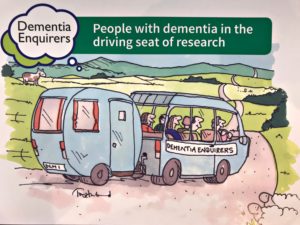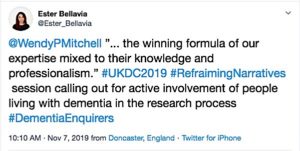 At the 14th UK Dementia Congress, I had the opportunity of meeting a few members of the UK Network of Dementia Voices, poignantly known as DEEP–Dementia Engagement and Empowerment Project [1]. The DEEP group includes people pioneering for the active involvement of people living with dementia in research, developing involvement resources, offering opportunities to be involved, and taking the much-needed initiative to bring about enduring changes.
At the 14th UK Dementia Congress, I had the opportunity of meeting a few members of the UK Network of Dementia Voices, poignantly known as DEEP–Dementia Engagement and Empowerment Project [1]. The DEEP group includes people pioneering for the active involvement of people living with dementia in research, developing involvement resources, offering opportunities to be involved, and taking the much-needed initiative to bring about enduring changes.
On 7th November, I participated in two sessions where members of the DEEP group delivered captivating presentations which triggered rather animated debates around the barriers faced by people living with dementia when involved in research. More importantly, it paved the way for meaningful discussions on solutions to promulgate trustworthy research collaborations.
Personally, in addition to the interesting amount of material offered to the conference attendees, I felt intrigued by their presentation of the Dementia Enquirers project.
 The Dementia Enquirers is a 3-and-a-half-year project funded by The National Lottery Community Fund that aims to develop a new approach to research. i.e. research led by people living with dementia who take the leap of faith and collaborate with members of the Innovations in Dementia group–community interest company–and local academic mentorship, if appropriate.
The Dementia Enquirers is a 3-and-a-half-year project funded by The National Lottery Community Fund that aims to develop a new approach to research. i.e. research led by people living with dementia who take the leap of faith and collaborate with members of the Innovations in Dementia group–community interest company–and local academic mentorship, if appropriate.
What I find innovating about this project is the opportunity it affords to people living with dementia to lead a research study in a more profound, empowering way because they are at the very frontline. I believe that having people living with dementia driving on the ‘research road’ will make a significant contribution to the research scenario and not only identifying unexplored topics of inquiry and/or finding alternative ways of practice. Indeed, as they become increasingly aware of the ‘behind the scenes’ challenges and demonstrate accountability for any choice made in terms of design, ethics, data collection/analysis and dissemination, they may illuminate debilitating barriers to involvement from a researcher’s standpoint.
 If you were to put on my lenses, and see what I see, you may agree that this project could potentially influence the wider research world scenario, including policymakers and funders. I am not sure if DEEP members would concur with me on that and to be clear, I do not intend to belittle or discredit years of documented, tokenistic involvement. Nevertheless, I cannot avoid considering the tireless efforts of many colleagues doing their utmost to promote sustainable, effective involvement, but often unable to deliver it for different and uncontrollable reasons.
If you were to put on my lenses, and see what I see, you may agree that this project could potentially influence the wider research world scenario, including policymakers and funders. I am not sure if DEEP members would concur with me on that and to be clear, I do not intend to belittle or discredit years of documented, tokenistic involvement. Nevertheless, I cannot avoid considering the tireless efforts of many colleagues doing their utmost to promote sustainable, effective involvement, but often unable to deliver it for different and uncontrollable reasons.
Driving the ‘research road’ could truly help to achieve genuine and seemingly elusive change in involvement practices, build a ‘set in stone’ bridge between researchers and people living with dementia, and achieve what Wendy Mitchell defines as ‘winning formula’:
Summing up, I was pleased to meet some of the DEEP members in the latest UK Dementia Congress and unravel new layers about their engaging and empowering work. With their activism documented in their official website and through their social media outreach, they offer myriad resources that are developed to facilitate and promulgate the involvement of people living with dementia in research. However, as demonstrated by various evaluative studies, meaningful involvement is often predicated on subjective opinions and assumptions as opposed to evidence. Hopefully, I will be able to contribute to that with findings from my PhD project.
Author
Ester Bellavia [2]is a Alzheimer’s Society funded, PhD candidate at Newcastle University [3]. Currently conducting a research aiming to explore the role of Patient and Public Involvement in dementia research and explain how best to involve people living with dementia and family carers. A basketball player and fan, originally from Italy with a background in nursing both overseas and within the NHS, where she also completed an NIHR funded MA in Research Methods at the University of Nottingham.